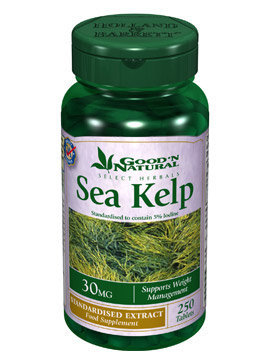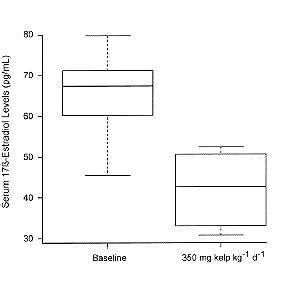Kelp Has Anti-Estrogenic Effects
Blog Entry #54
By Admin – Steroidal.com
Kelp is not a planet but seaweed or algae found in the sea. Its nutritional values are that it may include the strengthening of the circulatory system, provision of strong bones and teeth, cancer fighting benefits and reducing the risk of strokes and heart disease. Kelp is rich in nutrients, most of all iodine. This helps stimulate the thyroid gland and controls metabolism. Kelp is also a good food to prevent or treat infections; its large iodine content helps the body fight bacteria and foreign bodies.
We have written about foods that can be used to treat or prevent high estrogen levels, or help control side effects associated with estrogen. Gynecomastia, acne, aggression, behavioural changes, low libido, impotence and cholesterol problems are all attributed to estrogen levels. Consuming foods that help regulate these nasty hormones can help us avoid side effects. Today we’re going to look at how kelp can help us control estrogen.
A study done in 2005 at the University of California, in America, sought to find out if kelp had an estrogenic effect and lasted four weeks. Populations that eat large amounts of anti-estrogenic foods tend to have lower cancer rates. Japan seems to be one of these countries. The researchers wanted to know if kelp consumption could be a factor in their high longevity rates as it may lower estrogen. Women have longer menstrual cycles in Japan, but most of these anti-cancer effects wee put down to their large soy consumption.
The US researchers gave female rats between 175-350mg of kelp per kilogram of bodyweight per day. The figure below shows the results. In the group given the highest seaweed dose, estrogen was inhibited the most.
The US researchers went a couple of stages further to try to understand how the kelp inhibits estrogen production. So they exposed human ovary cells to the kelp and recorded the results. Again, the large the amount of kelp exposed to the ovary cells, the greater the estradiol inhibition. The kelp exposure actually led to a 35-43% decrease in estrogen levels.
Limitations are that this is an animal study done on female rats. More data is needed.
Kelp can be supplemented and it may help control estrogens nasty side effects. Claiming it can be used instead of an aromatase inhibitor (AI) or selective estrogen-receptor modulator (SERM) is a little too far, but add it to your diet for its anti-estrogen control and nutrient content.
Source:
J Nutr. 2005 Feb;135(2):296-300.








